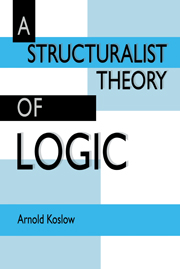Book contents
- Frontmatter
- Contents
- Preface
- Part I Background
- Part II Implication relations
- Part III The logical operators
- Part IV The modal operators
- 25 Introduction
- 26 Modality
- 27 Modals: Existence and nonextensionality
- 28 Special modals
- 29 The possibility of necessity-style modals
- 30 Modals revisited I
- 31 Quantification and modality
- 32 Modals revisited II
- 33 Knowledge, truth, and modality
- 34 The comparative strength of modals
- 35 Kripke-style systematization of the modals without possible worlds
- 36 Model functions, accessibility relations, and theories
- 37 Migrant modals
- Appendix A An implication relation for the integers in the programming language BASIC
- Appendix B Symmetric sequents as products of implication relations and their duals
- Appendix C Component-style logical operators and relevance
- Notes
- Bibliography
- Index
- Frontmatter
- Contents
- Preface
- Part I Background
- Part II Implication relations
- Part III The logical operators
- Part IV The modal operators
- 25 Introduction
- 26 Modality
- 27 Modals: Existence and nonextensionality
- 28 Special modals
- 29 The possibility of necessity-style modals
- 30 Modals revisited I
- 31 Quantification and modality
- 32 Modals revisited II
- 33 Knowledge, truth, and modality
- 34 The comparative strength of modals
- 35 Kripke-style systematization of the modals without possible worlds
- 36 Model functions, accessibility relations, and theories
- 37 Migrant modals
- Appendix A An implication relation for the integers in the programming language BASIC
- Appendix B Symmetric sequents as products of implication relations and their duals
- Appendix C Component-style logical operators and relevance
- Notes
- Bibliography
- Index
Summary
We have characterized the modal operators as a special type of function that maps the set of an implication structure to itself. Certainly there are such operators, as the various examples show. It is also true that these operators behave in ways that modals are supposed to. They appear, then, to be familiar, not foreign. They count as modal. One question remains: How do some of the familiar kinds of modals figure in this scheme of things? One of our aims is to capture most, if not all, of what has usually been regarded as modal. Have we done so? Are there any blatant omissions? We turn now to a review of some traditional and nontraditional sources for modal operators.
Modal Operators of Normal Modal Systems
Normal modal systems consist of the language of the classical sentential calculus, with the addition of the box, □, to its vocabulary, and appropriate formation rules. In addition to the distribution axiom □(p → q) → (□p → □q), they have the rules modus ponens, necessitation, and, in some formulations, substitution. These systems differ from each other in the addition (beyond the distribution axiom) of axioms involving the box. The simplest normal system is (K), which has only the distribution axiom. (The usual normal systems were described in Chapter 25, notes 1 and 2.)
Let (L) be a normal modal system.
Information
- Type
- Chapter
- Information
- A Structuralist Theory of Logic , pp. 301 - 311Publisher: Cambridge University PressPrint publication year: 1992
